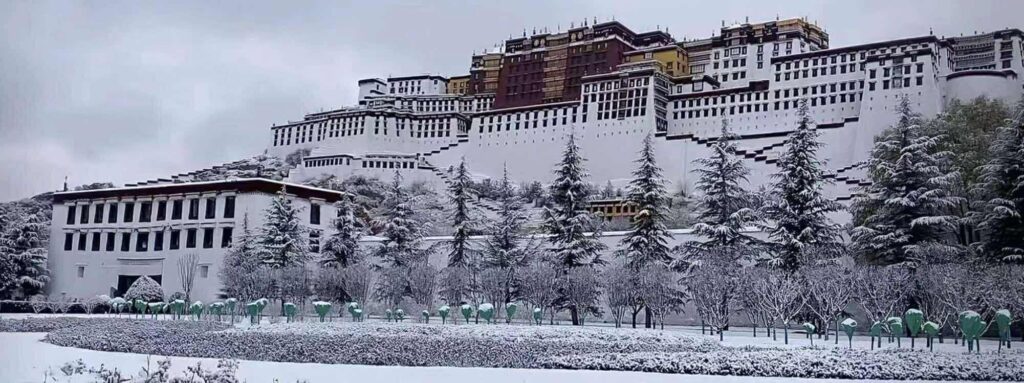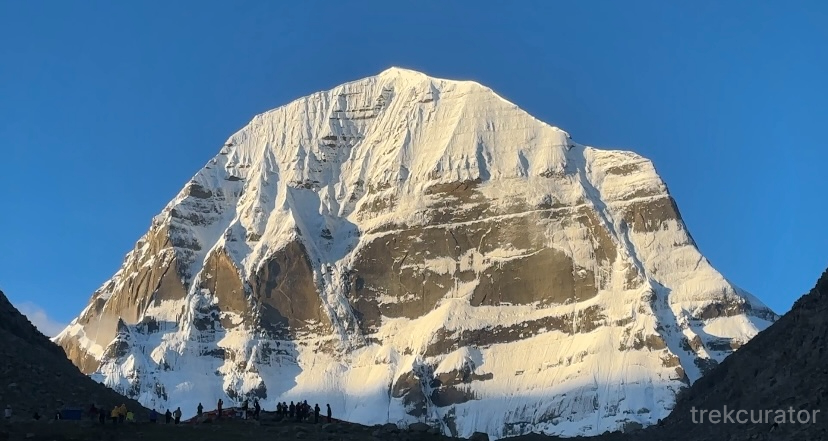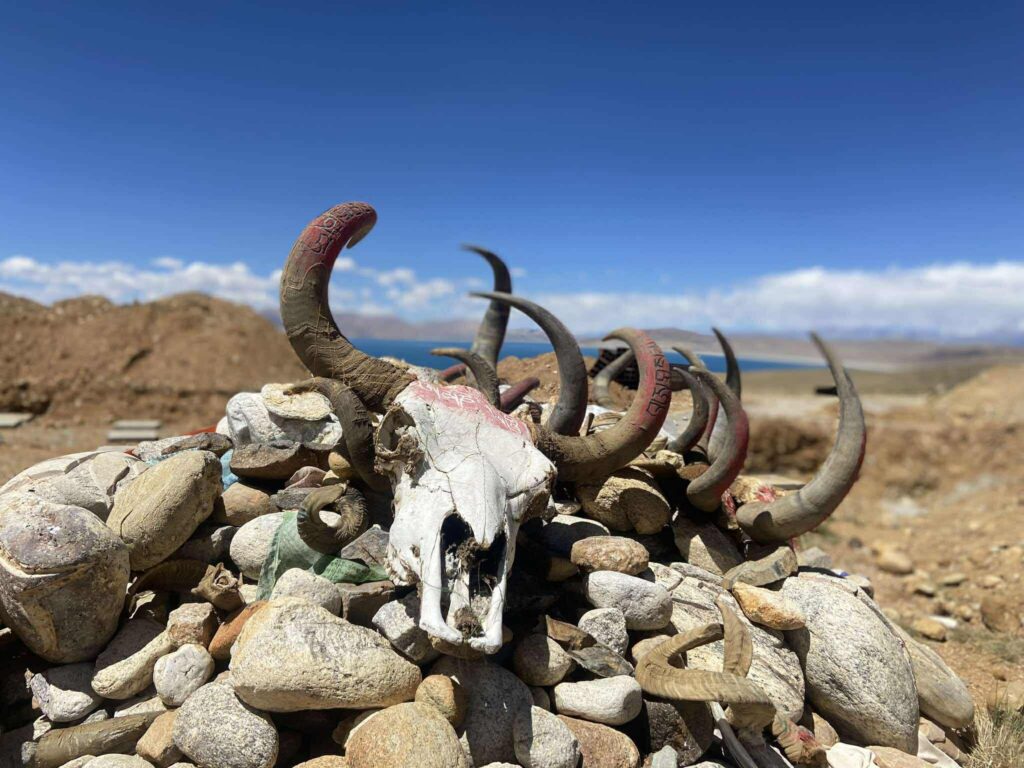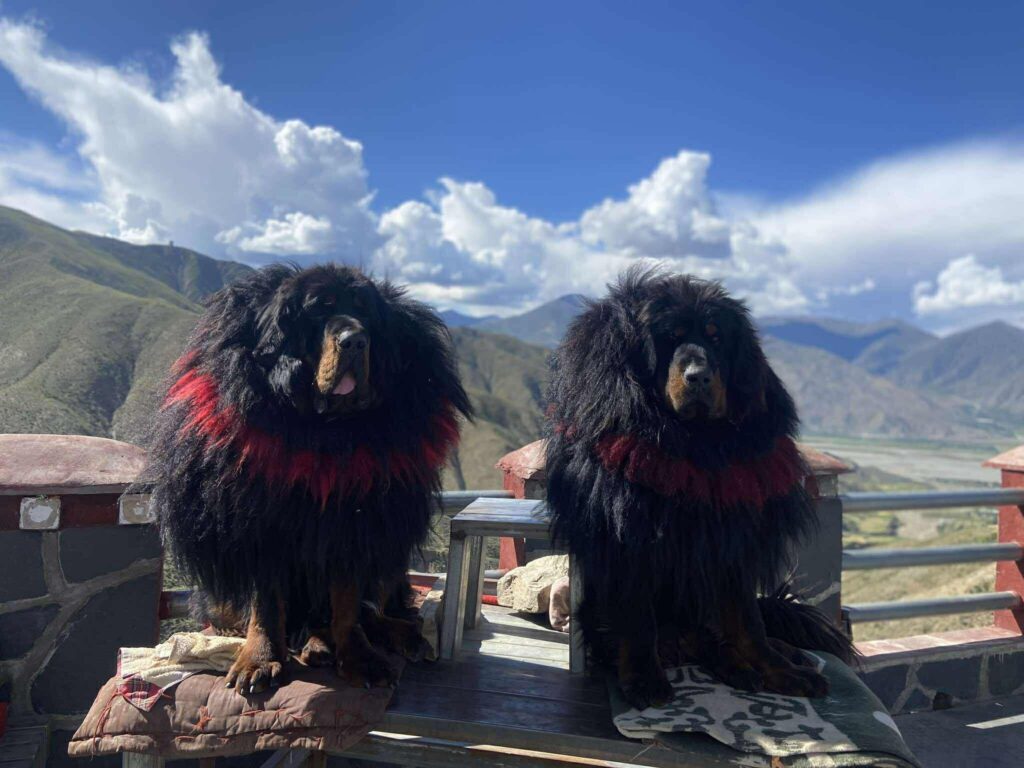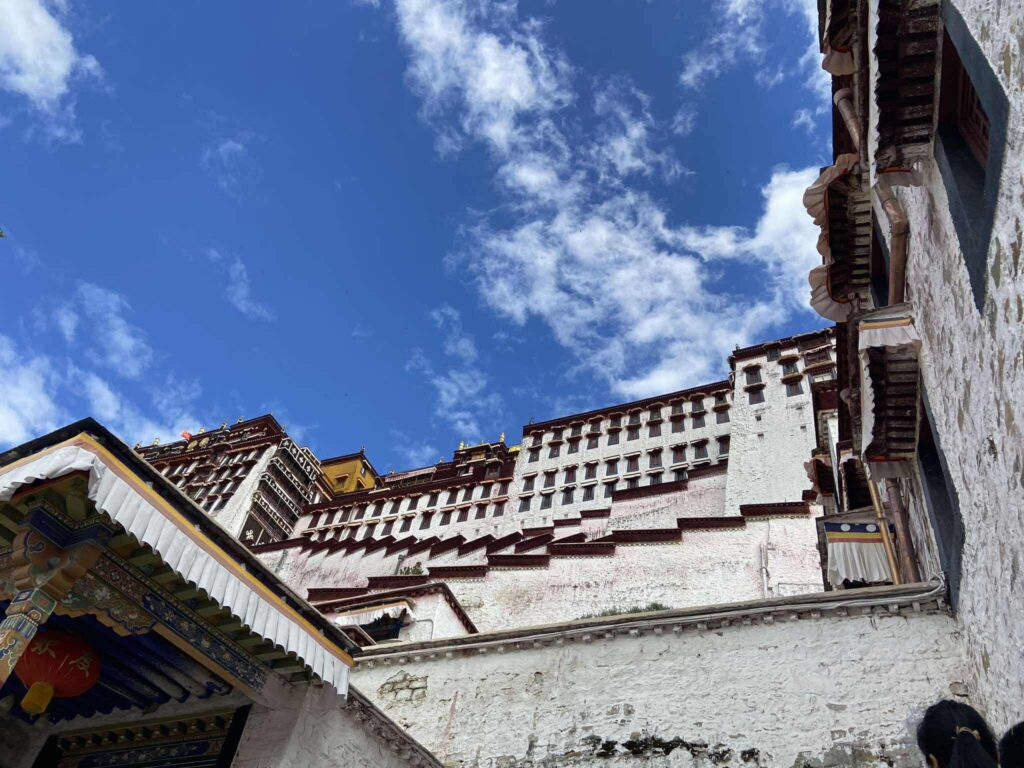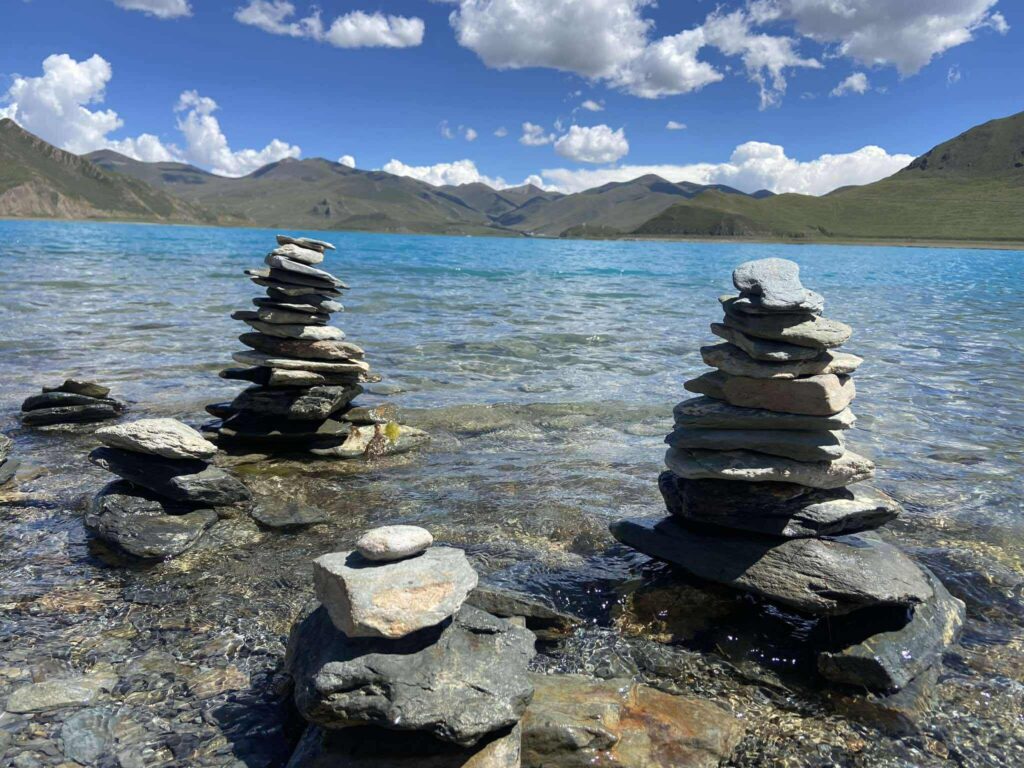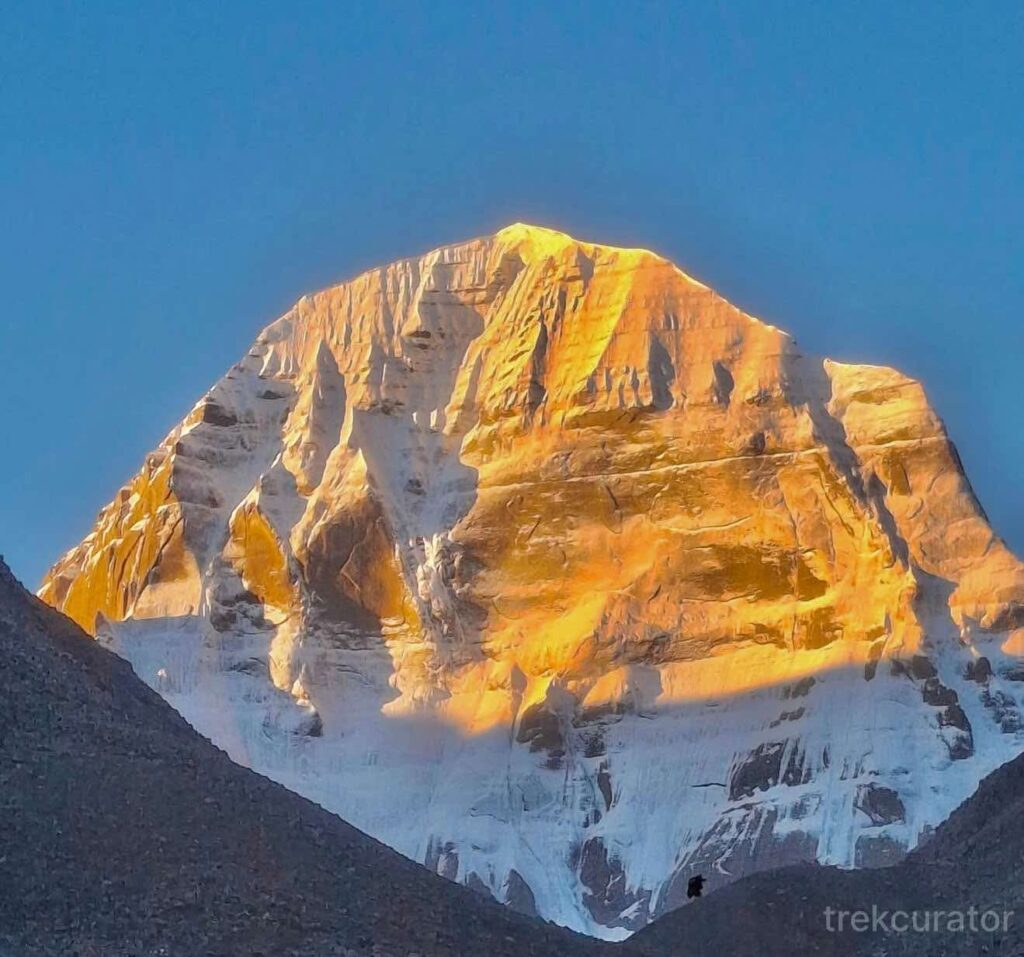Kailash Mansarovar Yatra via Lhasa
Be the first to review!
Arrival → Kathmandu → Lhasa → Shigatse → Saga → Lake Manasarovar → Darchen → Yamadwar → Derapuk → Drolma La Pass → Juthulpuk → Saga → Kathmandu → Departure
Overview
Kailash Mansarovar via Lhasa
Experience the spiritual power of Mount Kailash and the serenity of Lake Mansarovar with our expertly guided route through Lhasa.
Introduction
Embarking on the Kailash Mansarovar Yatra via Lhasa is a sacred journey that beautifully intertwines elements from Hindu, Buddhist, Jain, and Bon traditions. This spiritually enriching and adventurous trek leads you to the majestic Mount Kailash and the serene Lake Manasarovar. The journey begins in Kathmandu, where travelers explore sacred temples before proceeding to Lhasa, the cultural heart of Tibet. According to ancient scriptures, Lhasa is regarded as the spiritual center of the universe.
This journey uniquely merges cultural exploration of Tibetan Buddhism and rituals with the ultimate sacred circumambulation of Kailash, visiting monasteries known to be among the holiest pilgrimages. It also offers a chance to purify your mind, body, and soul through prayers, meditation, and the holy kora. It’s a perfect blend of deep religious significance, thrilling high-altitude adventure, and stunning Himalayan landscapes. Ultimately, it’s where faith meets adventure.
Kathmandu’s Sacred Sites
The Yatra typically begins with visits to sacred sites in Kathmandu. Here, travelers will explore the Pashupatinath Temple, a major pilgrimage site dedicated to Lord Shiva, as well as the Gujeshwari Temple, linked to the goddess Sati, and the Bouddhanath Stupa, one of the largest Buddhist stupas in the world. Additional sites include the beautiful Jalnarayan Temple, featuring a reclining Vishnu and Swayambhunath Stupa, also known as the “Monkey Temple,” where you can enjoy spectacular views of the Kathmandu valley.
Cultural Experience in Lhasa
In Lhasa, travelers can immerse themselves in the local culture by visiting the Potala Palace, a UNESCO World Heritage Site and former residence of the Dalai Lama. The Jokhang Temple serves as Tibet’s spiritual heart, while Barkhor Street offers a taste of a traditional Tibetan market and pilgrimage circuit.
Lake Manasarovar
Lake Manasarovar is venerated as a source of purity and life, making it ideal for ritual bathing, meditation, and offering prayers. It is believed to cleanse sins and bestow blessings. Visitors also have the opportunity to glimpse Lake Rakshastal, which is associated with the mythological figure Ravana.
Mount Kailash Kora
- Day 1: Trek from Yamadwar to Derapuk, featuring breathtaking views of Kailash’s north face.
- Day 2: Cross the Drolma La Pass (5,630m), the trek’s most challenging yet spiritually rewarding segment.
- Day 3:Continue to Juthulpuk and complete the sacred circuit.
Why Choose This Tour?
This pilgrimage is considered the ultimate journey for Hindus and Buddhists alike, uniquely combining cultural exploration in Kathmandu and Lhasa with the spiritual adventure of Kailash–Mansarovar. It offers a well-rounded experience of spiritual devotion, cultural immersion, and nature exploration all in one trip. Also, walking around Mount Kailash is a once-in-a-lifetime experience cherished by pilgrims and travelers from around the globe. Additionally, participants can engage in puja meditation and take a holy dip in Mansarovar. The tour also provides expert guidance from a professional support team, ensuring safe and smooth trekking logistics and safety.
Start your Yatra today – Reserve your place on this sacred path!
more packages
– [Kailash Mansarovar Yatra by Helicopter trip package – Fastest Route]
– [Kailash Mansarovar Yatra Overland via Kerung trip package – Most Popular]
✅ What's Included:
Accommodation: Hotels in Kathmandu, Lhasa, Shigatse, Saga, and guesthouses during the trek
Meals: Daily breakfast, lunch, and dinner during the trek and tour days
Transportation: Airport transfers, Kathmandu-Lhasa-Kathmandu flights, road transfers in Tibet (Lhasa to Kailash and back)
Permits & Fees: Tibet Travel Permit, Kailash Entry Permit, Sagarmatha National Park Permit, and all necessary government fees
Guides: Experienced English-speaking local guides and trekking support team
Trekking Support: Porters and/or horses for carrying luggage during Kailash Kora trek
Sightseeing: Entrance fees to all listed temples, monasteries, and cultural sites in Kathmandu and Lhasa
Medical Support: Basic first aid kit and altitude sickness management assistance
Spiritual Activities: Guided puja ceremonies, meditation sessions, and ritual bathing at Lake Manasarovar
Travel Insurance: Emergency evacuation and rescue insurance during the trek (if provided)
Cultural Experiences: Participation in Tibetan rituals, local market visits, and spiritual tours
Arrival & Departure Assistance: Meet and greet services at airports
❌ Price Excludes:
International Airfare: Flights to and from Kathmandu (arrival and departure city)
Visa Fees: Indian visa or Nepal entry visa, Tibet visa fees (unless arranged by the operator)
Personal Expenses: Laundry, phone calls, tips, souvenirs, and extra snacks/drinks
Travel Insurance: Comprehensive travel insurance covering trip cancellation, medical evacuation (unless included)
Altitude Sickness Medication: Such as Diamox or other prescription drugs
Optional Activities: Any optional tours or side trips not mentioned in the itinerary
Single Supplement: Extra charges for solo travelers requiring a single room
Excess Baggage Fees: At airports or during flights
Tips & Gratitudes: For guides, porters, drivers, and hotel staff (customary but voluntary)
Itinerary Overview
Day 1: Arrival in Kathmandu
Day 2: Full-Day Sightseeing in Kathmandu
Day 3: Kathmandu to Lhasa
Day 4: Full-Day Sightseeing in Lhasa
Day 5: Lhasa to Shigatse
Day 6: Shigatse to Saga
Day 7: Saga to Manasarovar
Day 8: Exploration of lake Manasarovar and Drive to Darchen
Day 9: Darchen to Yamadwar then Trek to Derapuk
Day 10: Trek to Juthulpuk via Drolma La Pass
Day 11: Finish Kailash Kora, Drive back to Saga
Day 12: Driver from Saga to Kathmandu
Day 13: Departure
Detail Itinerary
Arrival in Kathmandu
Upon arriving at Tribhuvan International Airport in Kathmandu (1,400m), you will be warmly welcomed by our representative, who will then take you to your hotel. After checking in, take some time to freshen up and acclimatize to the altitude. If time allows, feel free to explore the nearby local markets (Thamel) or simply unwind and enjoy a peaceful evening. Dinner will be served at the hotel, where you’ll have the chance to meet fellow yatris—an opportunity to connect with others who will share this memorable pilgrimage. You’ll spend the night at the hotel in Kathmandu.
Full-Day Sightseeing in Kathmandu
Get ready for a full day of exploration in Kathmandu! After a hearty breakfast, you’ll be picked up from the hotel and head to the sacred Pashupatinath Temple, a major site for Shiva worship. Here, you’ll have the chance for darshan and may witness morning aarti rituals, traditional cremations, and sadhus in deep meditation. Next, visit the Boudhanath Stupa, a significant spiritual hub for Tibetan Buddhists. Your sightseeing will culminate at the Swayambhunath Stupa, also known as the “Monkey Temple,” where you can enjoy spectacular views of the Kathmandu valley. Also, you will visit the Gujeshwari Temple, linked to the goddess Sati, and the Jalnarayan Temple, featuring a reclining Vishnu . After the day’s adventures, you will return to your hotel and take a moment for any last-minute shopping for warm clothes, snacks, or essential items. In the evening, you will attend a comprehensive pre-yatra orientation session, where you’ll receive important information regarding the yatra and gather necessary documents (passport, photos, travel insurance). You’ll also receive valuable tips on altitude sickness, clothing, safety, and food. After the session concludes, dinner will be served.
Kathmandu to Lhasa
Rise early according to your flight time, as you’ll be picked up from the hotel and taken to the airport. Enjoy a scenic flight from Kathmandu to Lhasa (Gonggar Airport), where, weather permitting, you might catch glimpses of Mt. Everest, Kanchenjunga, and Makalu. After approximately 1.5 hours, upon landing at Gonggar Airport in Lhasa (3,650m), you’ll be transferred to your hotel for check-in. The rest of the day is free for rest and acclimatization—remember to hydrate and avoid physical exertion to prevent altitude sickness. A light evening walk is optional. You’ll spend the night in Lhasa.
Full-Day Sightseeing in Lhasa
Today, immerse yourself in the rich culture of Lhasa. Visit the iconic Potala Palace, a UNESCO World Heritage Site and former residence of the Dalai Lama, which houses sacred shrines and relics. Then, explore Jokhang Temple, Tibet’s most revered spiritual center, filled with pilgrims prostrating in devotion. Your day wraps up with a stroll through Barkhor Street, the traditional marketplace where you can shop for Tibetan souvenirs, prayer wheels, and thangka paintings. If time permits, consider visiting a local Tibetan medicine center or monastery before returning to your hotel to prepare for the next day’s journey.
Lhasa to Shigatse
After breakfast, set off on a scenic drive to Shigatse. You’ll be treated to beautiful views along the Yarlung Tsangpo River and traverse the Kambala Pass (4,800m). If time allows, stop by Yamdrok Lake, a stunning turquoise body of water considered one of Tibet’s holiest lakes. You may also visit Pelkor Monastery and Gyantse Kumbum in Gyantse. After a 5 to 6-hour drive, you’ll arrive in Shigatse (3,800m), Tibet’s second-largest city. Time permitting, explore Tashilhunpo Monastery, the seat of the Panchen Lama, before settling in for the night.
Shigatse to Saga
Prepare for an early departure this morning as you embark on a long drive of approximately 450 km. Enjoy the breathtaking views of the Tibetan plateau, driving along the Brahmaputra River (Yarlung Tsangpo) while crossing high-altitude passes and vast plains. A stop at Lhatse for meals will provide a much-needed break. Surrounded by stunning landscapes with vistas of the Himalayas, rivers, and nomadic settlements, you’ll reach Saga (4,640m) in the evening, where you can rest in your hotel to acclimatize. Overnight stay in Saga.
Saga to Manasarovar
After breakfast, you’ll set out on a scenic drive through the stark, barren landscapes of Paryang, navigating high passes that offer stunning views of the snow-capped peaks. As you near Horchu, you’ll catch your first glimpse of the majestic Mount Kailash from a distance. After approximately 8 to 9 hours on the road, you’ll arrive at Lake Manasarovar, a sacred site for Hindus, Buddhists, Jains, and Bon followers, believed to be a wellspring of spiritual power. Here, you can engage in various spiritual rituals (puja), meditate, or take a holy bath, weather permitting. Collecting some of the lake’s holy water in a bottle or small container is a recommended practice. Later, you’ll visit the nearby Rakshas Tal, a lake associated with the demon king Ravana. You’ll spend the night at a guesthouse or camp near Manasarovar.
Exploration of lake Manasarovar and Drive to Darchen
Begin your day with morning meditation and an optional short kora (circumambulation) around the lake. Next, you’ll visit Chiu Monastery, perched on a hilltop that overlooks the lake, providing panoramic views. Engage in further spiritual activities such as chanting, reading scriptures, or participating in group prayers. Afterward, you’ll enjoy a brief drive to Darchen (4,670m), the base for the Mount Kailash Kora (circumambulation). During your time here, you’ll prepare for the 3-day trek ahead, receiving a briefing on what to expect. You can hire yaks, porters, or horses if needed, followed by a final health check and oxygen level assessment. You will spend the night in Darchen.
Darchen to Yamadwar then Trek to Derapuk
A short drive will take you to Yamadwar, known as the Gateway to the God of Death, marking the symbolic start of the kora. You’ll perform prayers here before embarking on your first day of parikrama. The trek to Derapuk (4,900m) offers breathtaking views of the North Face of Mount Kailash. Although the trek is challenging, the spiritual experience is incredibly uplifting, featuring mostly flat terrain with gradual ascents. You’ll overnight at a guesthouse or tent in Derapuk.
Trek to Juthulpuk via Drolma La Pass
This day is considered the most challenging of the journey. You’ll ascend to the Drolma La Pass (5,630m), the highest point of the trek, where you’ll pause to offer prayers that symbolize liberation. From there, you’ll descend to Gauri Kund, a sacred lake associated with Goddess Parvati, where it’s believed she bathed. Continuing to Zuthulpuk (4,790m), you’ll pass meditation caves used by saints and monks. Overnight accommodations will be basic at Zuthulpuk.
Finish Kailash Kora, Drive back to Saga
On this day, you’ll trek for about three hours to reach the endpoint of the kora near Darchen. A vehicle will be waiting to transport you back, kicking off your return journey. You’ll drive back to Darchen to gather your belongings and then continue to Saga. Along the way, you’ll have lunch and some time to reflect on your spiritual and physical transformation. Take the chance to explore nearby sites or interact with locals, and you’ll spend the night in Saga.
Drive from Saga to Kathmandu
Early in the morning, you’ll head to Kathmandu, driving via the Kyirong Border. Enjoy a scenic drive across the Tibetan plateau, passing small villages and picturesque valleys. You’ll stop for lunch either at Paryang or Old Dzongba and will then continue your drive towards Kyirong Town, near the Nepal-China border, winding through mountain roads, rivers, and dramatic Himalayan scenery. After reaching Kyirong, you’ll proceed to the Rasuwagadhi Border Checkpoint, completing immigration and customs procedures on both sides. Cross the Friendship Bridge into Nepal on foot, then catch a Nepalese vehicle at the border to continue your journey to Kathmandu via Syabrubesi, Dhunché, and the Trishuli Highway.
Departure
Depending on your flight schedule, enjoy breakfast and perhaps do some last-minute shopping or a stroll through Thamel for souvenirs or prayer items. Make sure all your belongings, including personal items and holy water, are packed and ready. Our representative will arrange your airport drop-off about 3–4 hours before your flight, assisting with check-in and immigration if needed. Fly back home, carrying with you the memories of a deeply spiritual and transformative journey.
Additional Information:
Permits and Visas
Traveling to Mount Kailash and Lake Mansarovar requires special permits, as the area is part of China’s Tibet Autonomous Region. Whether you are an Indian citizen or a Non-Resident Indian (NRI), independent travel to Kailash is not permitted; all pilgrims must join a registered tour operator.
For Indian Passport Holders:
You will need a Tibet Travel Permit along with a Group Visa, both of which our team will arrange for you. There’s no need to apply separately for a Chinese visa, as we handle this as part of the group visa process completed in Delhi before you enter Nepal. Please note that the status of the 2025 Yatra commencement is yet to be confirmed.
For NRIs and Foreign Passport Holders:
NRIs follow a slightly different procedure involving a group permit list. The Chinese Visa Centre and Embassy in Kathmandu typically require your original passport for around 3 to 4 business days. To avoid last-minute complications, we advise travelers to send passport scans and necessary documents early and ensure their names are included in the permit list.
Scenery and Transport
Prepare to be amazed by the pristine beauty of the Tibetan Plateau. The landscape transforms dramatically from the lush greenery around Kathmandu to the stark, high-altitude deserts of Tibet, where majestic snow-capped peaks dominate the horizon.
To ensure your journey is safe and comfortable through these challenging terrains, we provide well-maintained vehicles such as Toyota Land Cruisers or modern buses, selected based on group size and road conditions. Our experienced Tibetan drivers are skilled at navigating the altitude and terrain. Your trip will involve a mix of smooth highways, rough off-road stretches, and lengthy scenic drives — reliable vehicles are essential for a smooth experience.
Meals Prepared by Kitchen Staff
Even at high altitudes, nourishing food is essential for both the body and soul. That’s why our trained kitchen team travels with the group, providing fresh, pure vegetarian meals throughout the journey. Expect wholesome, simple dishes such as rice, dal, vegetables, soups, tea, and fruit, with careful attention to hygiene and dietary preferences. Hot water for drinking and morning tea will be provided daily, and special diets like Jain or no onion-garlic can be accommodated upon request. Meals will be served in clean communal tents or dining halls whenever possible.
Fitness Requirement & Age Limit
Especially important for senior pilgrims.
Minimum fitness requirement (ability to walk 5–6 hrs/day at altitude)
Recommended age range (e.g., 18–70 years, subject to medical fitness)
Medical certificate requirement (if any)
Horses and Porters for the Parikrama
The Kailash Parikrama is a spiritually significant yet physically demanding trek. For those who need assistance—especially older pilgrims or those acclimatizing—horses and porters are available for hire locally for the three-day pilgrimage. Horses, accompanied by handlers, can carry you during the Parikrama, except for the Dolma La Pass, while porters can carry your daypack, water, snacks, or oxygen bottles. These services are optional and not included in the basic package price. We can help arrange these in advance or assist with bookings once you arrive in Darchen.
Accommodation and Services
While luxury options are limited in this remote region, we ensure your accommodations are the best available. In Kathmandu, you’ll stay in comfortable 3- or 4-star hotels featuring hot showers, Wi-Fi, and modern amenities. In Tibet, lodging includes 3-star hotels in major towns. At Lake Mansarovar and during the Parikrama, accommodations may consist of basic guesthouses or tented camps. Although these places are simple, they maintain cleanliness, provide warm meals, and offer a supportive environment. Some remote areas lack running hot water but provide warm blankets and basic bedding.
Our dedicated team—which includes a Nepali tour leader, Tibetan guide, kitchen crew, and support staff—will travel with you throughout to ensure smooth logistics, daily briefings, and personalized care.
Booking Policy and Necessary Documents
To secure your place for the Kailash Mansarovar Yatra 2025, an advance deposit is required at the time of booking, with the balance payable according to the terms provided. Necessary documents include:
– A passport scan (valid for at least six months from the start date)
– Passport-sized photographs (a digital image on a white background)
– Citizenship proof (for Indian nationals)
We recommend booking early because the Chinese permit system operates on group arrangements, and spots fill up months in advance.
Emergency Evacuation
Safety and health are paramount when traveling at high altitudes. While we take all precautions, emergency evacuation is available for cases such as acute mountain sickness, injuries, or severe weather conditions. Our team carries first aid supplies, oxygen tanks, and oximeters for daily oxygen monitoring. In serious cases, we coordinate with local authorities and hospitals for evacuation to the nearest medical facility or back to Kathmandu. Helicopter evacuation can be arranged within Nepal for an additional fee, depending on weather conditions.
We strongly recommend purchasing travel insurance that covers emergency evacuation at high altitudes—providing peace of mind for your journey.
EQUIPMENTS
- Valid passport (with minimum 6 months validity)
- Chinese visa and Tibet travel permit (arranged by operator)
- Passport-size photographs
- Travel insurance (mandatory)
- Local currency (Chinese Yuan) and/or international debit card
- Thermal inner wear (top & bottom)
- Heavy down jacket / windproof jacket
- Warm fleece / woolen sweaters
- Waterproof pants and comfortable trekking trousers
- Woolen gloves, warm cap, muffler, and balaclava
- Cotton T-shirts and light pants for layering
- Woolen socks and extra pairs of cotton socks
- Comfortable trekking shoes
- Camp shoes / sandals for evenings
- Sunglasses with UV protection
- Sun hat / cap
- Sunscreen lotion (SPF 50+) and lip balm
- Walking stick / trekking pole
- Water bottles
- Duffle bag (for main luggage – provided by tour operator in most cases)
- ersonal medication and first-aid kit
- Diamox / medicine for altitude sickness (consult your doctor)
- Water purification tablets or filters
- Moisturizing cream and cold cream
- Oxygen cylinder / canisters (optional, available locally)
- Flashlight / headlamp with extra batteries
- Power bank and universal travel adapter
- Plastic zip-lock bags (for keeping documents dry)
- Dry fruits, energy bars, chocolates
Frequently Asked Questions
This sacred pilgrimage is a profound journey that intertwines the traditions of Hinduism, Buddhism, Jainism, and Bon. It encompasses spiritual rituals at the revered Mount Kailash and serene Lake Manasarovar, alongside a cultural exploration of Lhasa, including visits to the iconic Potala Palace and Jokhang Temple.
The Yatra involves traveling at high altitudes (reaching up to 5,630 meters) and includes moderate trekking. Individuals in good health and with average fitness levels can participate, provided they obtain medical clearance before the trip.
Trained staff will monitor your daily health and oxygen levels. Emergency oxygen cylinders and first-aid supplies are readily available. To combat altitude sickness, acclimatization days are strategically included, and we strongly recommend travel insurance with evacuation coverage. Staying properly hydrated and acclimated is essential for a safe experience.
The ideal time for this pilgrimage is from May to September, when Tibet experiences relatively stable weather. It’s best to steer clear of the winter months due to the possibility of snow and road closures.
In the event of severe altitude sickness or other medical emergencies, ground evacuation will be organized. Additionally, helicopter rescue services are available in the Nepal region for an extra fee. We work closely with local authorities to ensure rapid medical assistance when needed.
It’s advisable to book your trip at least 3 to 4 months ahead of your departure since permits are limited. Early booking guarantees your inclusion on the Chinese group permit list.
You can expect groups to consist of about 20 to 40 pilgrims, all supported by comprehensive logistical assistance.

